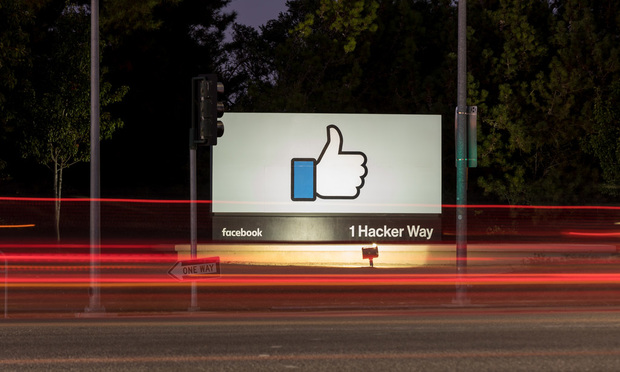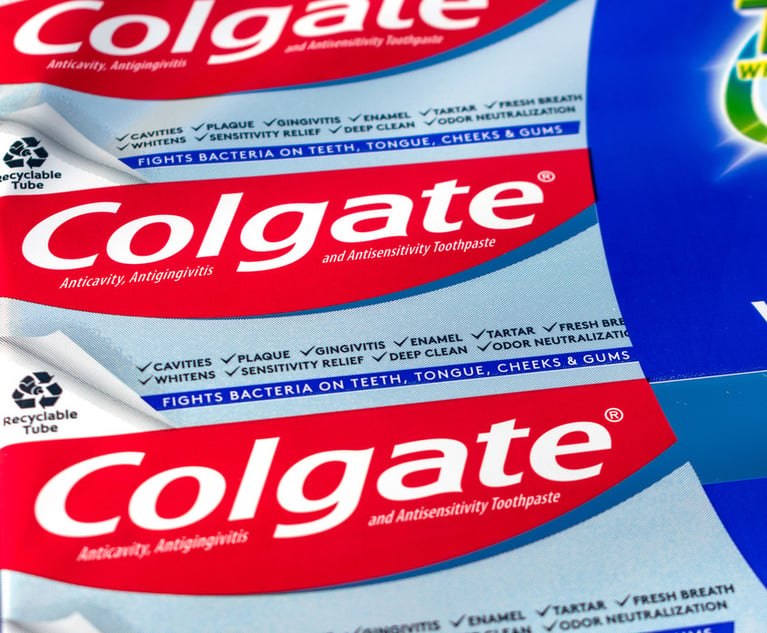Judge Certifies Class of Illinois Facebook Users in Privacy Suit Over Facial Recognition
The lawsuit, set to go to trial in July, confronts the company with billions in potential damages.
April 16, 2018 at 09:13 PM
3 minute read

A federal judge in San Francisco has certified a class of Illinois Facebook users in a privacy lawsuit set to go to trial later this year, escalating the stakes in a lawsuit that could result in billions of dollars in damages against the social media giant.
U.S. District Judge James Donato of the Northern District of California on Monday certified a class in a case brought against Facebook under the Illinois Biometric Information Privacy Act, or BIPA—a law governing the collection and storage of biometric indicators like fingerprints, facial features and iris scans.
A Facebook spokesperson said Monday afternoon that the company was reviewing the decision. “We continue to believe the case has no merit and will defend ourselves vigorously,” the spokersperson said.
Plaintiffs claim that Facebook violated BIPA by collecting and storing Illinois users' biometric data without prior notice or consent through its “Tag Suggestions” tool—a feature launched in 2011 that prompts users to identify friends in pictures uploaded to the social media site.
Donato in February rejected Facebook's bid to dismiss the suit, finding BIPA left “little question that the Illinois legislature codified a right of privacy in personal biometric information.”
In Monday's decision, Donato found that not all photos uploaded to Facebook resulted in the collection of biometric data. The judge rejected a proposed class of all Illinoisians with an uploaded photo during the class period as “too amorphous and potentially over-inclusive to be certified.”
But Donato found a more narrowly defined class–consisting of users in Illinois for whom Facebook stored a “face template” after June 7, 2011–could help address two questions central to the case: “[D]id Facebook's facial recognition technology harvest biometric identifiers as contemplated under BIPA, and if so, did Facebook give users prior notice of these practices and obtain their consent?”
Donato noted that Facebook's lawyers at Mayer Brown put great emphasis on their argument that not all class members qualified “aggrieved” parties under BIPA. Donato, however, wrote that Facebook's lawyers “almost exclusively” relied on Rosenbach v. Six Flags Entertainment, a December 2017 decision from Second District Appellate Court of Illinois which held that plaintiffs must allege “actual harm” to get BIPA claims to stick.
While Donato downplayed the persuasiveness of the Six Flags decision, calling it “a currently unpublished opinion by an intermediate court of appeals in Illinois,” he posited that the Illinois court likely would have found actual harm in the Facebook case. The Six Flags case, he noted, involved a season pass program where the amusement park clearly disclosed that it was collecting customer fingerprints to speed admissions.
Donato wrote “an express request for a fingerprint scan is a far cry from the situation here, where plaintiffs plausibly argue that simply using Facebook or reading Facebook's user policy did not put them on notice that Facebook was collecting their biometric data.”
The ruling sets up a high-stakes trial in the case, which is scheduled to begin in July. BIPA carries statutory damages of $1,000 for each negligent violation, and $5,000 for those that are “intentional and reckless.”
Jay Edelson of Edelson PC, one of the lead lawyers for plaintiffs in the cases, declined to comment. Shawn Williams of Robbins Geller Rudman & Dowd, who also represents the plaintiffs, said he was “very pleased” with the “detailed and thorough opinion.”
This content has been archived. It is available through our partners, LexisNexis® and Bloomberg Law.
To view this content, please continue to their sites.
Not a Lexis Subscriber?
Subscribe Now
Not a Bloomberg Law Subscriber?
Subscribe Now
NOT FOR REPRINT
© 2025 ALM Global, LLC, All Rights Reserved. Request academic re-use from www.copyright.com. All other uses, submit a request to [email protected]. For more information visit Asset & Logo Licensing.
You Might Like
View All
PayPal Faces New Round of Claims; This Time Alleging Its 'Honey' Browser Extension Cheated Consumers

Free Microsoft Browser Extension Is Costing Content Creators, Class Action Claims
3 minute read
Colgate Faces Class Actions Over ‘Deceptive Marketing’ of Children’s Toothpaste
Trending Stories
- 1Ticket-Fixing Scheme Results in Western NY Judge's Resignation—for a Second Time
- 2Legal Community Mourns the Loss of Trailblazing Judge Dorothy Chin Brandt
- 3Delaware Supreme Court, Reversing Chancery, Lowers Review Standard for TripAdvisor Move to Nevada
- 4Haynes and Boone Expands in New York With 7-Lawyer Seward & Kissel Fund Finance, Securitization Team
- 5Upstart Insurer That's Wowing Industry Hires AIG Legal Exec to Help Guide Global Expansion
Who Got The Work
J. Brugh Lower of Gibbons has entered an appearance for industrial equipment supplier Devco Corporation in a pending trademark infringement lawsuit. The suit, accusing the defendant of selling knock-off Graco products, was filed Dec. 18 in New Jersey District Court by Rivkin Radler on behalf of Graco Inc. and Graco Minnesota. The case, assigned to U.S. District Judge Zahid N. Quraishi, is 3:24-cv-11294, Graco Inc. et al v. Devco Corporation.
Who Got The Work
Rebecca Maller-Stein and Kent A. Yalowitz of Arnold & Porter Kaye Scholer have entered their appearances for Hanaco Venture Capital and its executives, Lior Prosor and David Frankel, in a pending securities lawsuit. The action, filed on Dec. 24 in New York Southern District Court by Zell, Aron & Co. on behalf of Goldeneye Advisors, accuses the defendants of negligently and fraudulently managing the plaintiff's $1 million investment. The case, assigned to U.S. District Judge Vernon S. Broderick, is 1:24-cv-09918, Goldeneye Advisors, LLC v. Hanaco Venture Capital, Ltd. et al.
Who Got The Work
Attorneys from A&O Shearman has stepped in as defense counsel for Toronto-Dominion Bank and other defendants in a pending securities class action. The suit, filed Dec. 11 in New York Southern District Court by Bleichmar Fonti & Auld, accuses the defendants of concealing the bank's 'pervasive' deficiencies in regards to its compliance with the Bank Secrecy Act and the quality of its anti-money laundering controls. The case, assigned to U.S. District Judge Arun Subramanian, is 1:24-cv-09445, Gonzalez v. The Toronto-Dominion Bank et al.
Who Got The Work
Crown Castle International, a Pennsylvania company providing shared communications infrastructure, has turned to Luke D. Wolf of Gordon Rees Scully Mansukhani to fend off a pending breach-of-contract lawsuit. The court action, filed Nov. 25 in Michigan Eastern District Court by Hooper Hathaway PC on behalf of The Town Residences LLC, accuses Crown Castle of failing to transfer approximately $30,000 in utility payments from T-Mobile in breach of a roof-top lease and assignment agreement. The case, assigned to U.S. District Judge Susan K. Declercq, is 2:24-cv-13131, The Town Residences LLC v. T-Mobile US, Inc. et al.
Who Got The Work
Wilfred P. Coronato and Daniel M. Schwartz of McCarter & English have stepped in as defense counsel to Electrolux Home Products Inc. in a pending product liability lawsuit. The court action, filed Nov. 26 in New York Eastern District Court by Poulos Lopiccolo PC and Nagel Rice LLP on behalf of David Stern, alleges that the defendant's refrigerators’ drawers and shelving repeatedly break and fall apart within months after purchase. The case, assigned to U.S. District Judge Joan M. Azrack, is 2:24-cv-08204, Stern v. Electrolux Home Products, Inc.
Featured Firms
Law Offices of Gary Martin Hays & Associates, P.C.
(470) 294-1674
Law Offices of Mark E. Salomone
(857) 444-6468
Smith & Hassler
(713) 739-1250







